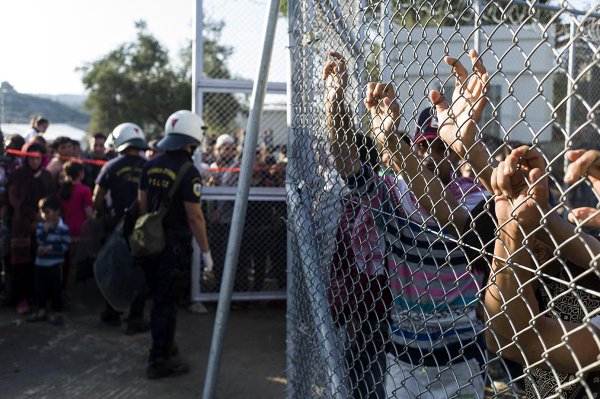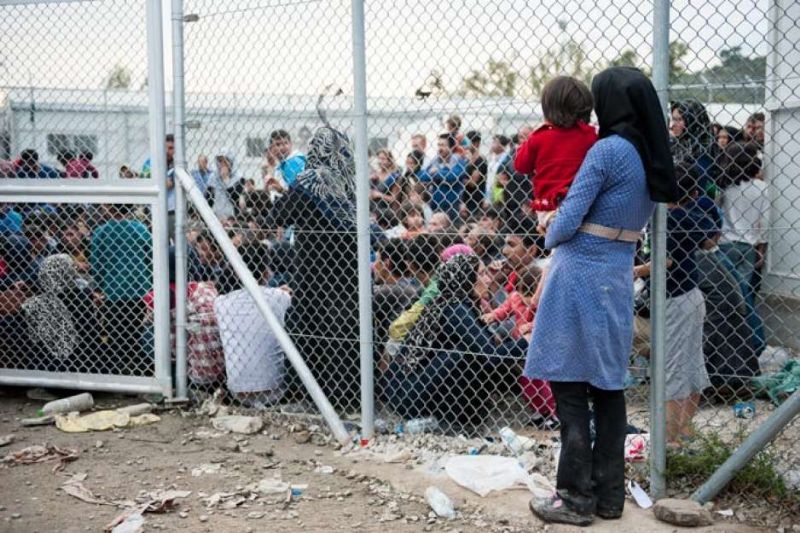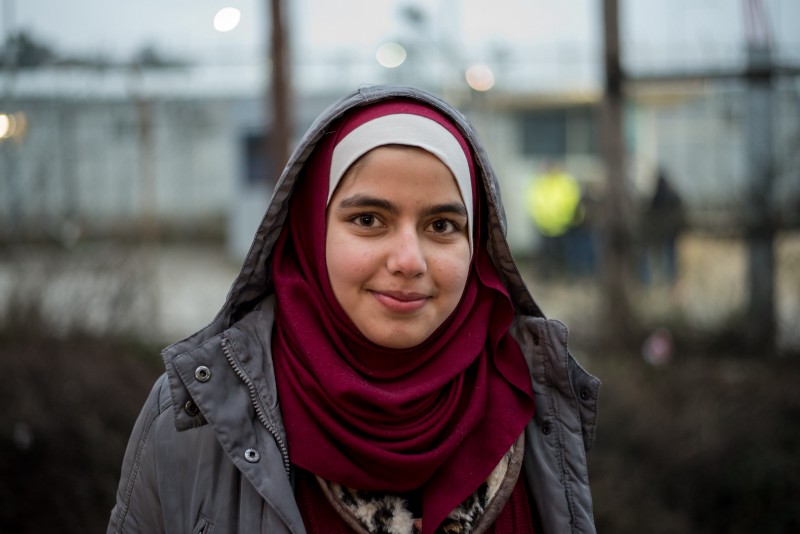On my first shift, a man suddenly went unconscious and collapsed, right on my feet.
It was a hot sticky night to begin with- more so from where I stood with twenty agitated refugee men and volunteers trying to figure out where we could cram more refugees into this overcrowded prison camp.
When he hit the gravel, the other refugees panicked and there was a lot of yelling and confused attempts to sit him back up.
It became evident no one knew what to do, and when one guy grabbed my water bottle and tried to pour water down the man’s throat (which would have choked him), my college job as a lifeguard kicked in.
I stopped waterbottle guy, sent someone to call for help and knelt by the man’s head to listen for breathing.
Help did not come. A volunteer said, “the doctors are so overloaded here, it takes them forever to respond during emergencies”.
So, defying all lifeguard protocol of waiting for help to arrive, I stood up and all twenty of his friends grabbed him legs, arms and whatever else they could help with and we all carried him to the medical tent.
And there I was, a couple hours into the month, with the reality of the refugee crisis dropped on me like a 200lb Syrian man.
That story captures the current state of this prison camp:
1. We have a big problem
2. Help is slow in coming
3. We get by with a little help from our friends
 I’m not allowed to take photos inside the camp, so all photos credit to Google Images.
I’m not allowed to take photos inside the camp, so all photos credit to Google Images.
A few hours ago, we were sitting on plastic chairs in a white room, being briefed by a forty-something American worker who has been here since last year, when the rafts were coming in by the hundreds. He looks tired, but speaks with conviction and hope. He’s very honest. I’ll call him Jon.
“It’s crazy in here, for good reason”, he began. “There’s bi-weekly riots because we’re asking thousands of people to get along with each other inside a few hundred meters, who have been fighting each other for centuries. There’s nowhere for them to go, and since boatloads more arrive every day, this prison camp is four times over capacity and there’s not enough blankets or water for everyone. So every family is fighting for their own family.”
Then Jon smiles. “But- we get to show them a new way. This is where loving your neighbor like you love yourself becomes real. Everyone here is used to war, and all they’ve known is an ‘eye-for-an-eye’. But Jesus has shown us what it means to love”.
When Jon shows us around camp, it’s in a story format:
“This is a housing container. Those punctures are from the riot last week”.
“This is the back door in case we have an evacuation. If it’s locked, wiggle through this hole in the fence here. It’s not electric”.
“This is the information tent. Earlier this year, the Pope and Angelina Jolie came to visit. A crew came in a week before and cleared out all the tents up to this point”, he says, gesturing, “they came in this far and no further, so the camp looked clean and not over-occupied”.
All the volunteers are aware there’s a cover-up going on here.
“Greece is bankrupt”, he explains, ‘Greece survives off of tourism, which has dropped off dramatically because of this crisis. Tourists won’t come if they think Lesvos is overrun with refugees, so the Greek government is very careful not to let reporters in here.”
It was hard for me to hear that. I wanted to run out to the nearest news agency and scream out what’s happening. I wanted to expose everything on social media. Because this issue is out of the news, and people think it’s over, so they don’t know they need to still help. I want help to come.
But I can see it from Greece’s perspective, too. They are also suffering. They can’t handle the weight of the flood of refugees alone.
“This can’t go on forever,” I say, “people can’t just keep piling up here”.
“Maybe Greece is waiting for things to really explode so that Europe finally notices, and opens its borders,” a European volunteer says, not hiding the frustration in his voice.
Maybe that’s what the rest of our countries are waiting for, too.
We (being, wealthy countries) effectively ignored the warning signs until we all saw that famous picture of a drowned Syrian boy washed up on a beach in Turkey, and ordinary citizens began to put pressure on their governments to respond.
I think we are in danger of ignoring this crisis again, until something shocks us.
What will it be? Will someone need to die here in a riot? Will the the food need to really run out?
I wonder if I’ll be here for that.
At the risk of sounding like I’m making an emotional argument, let me clarify: I’m not arguing about anything.
I can’t even fully comprehend what my government calls “the worst humanitarian crisis in the world today” (quotehere).
What is the ultimate solution? No more war, obviously. For a kingdom of love to take over.
It’s hard not to get cynical.
But I know it’s on it’s way.
With every kind word, with every friendship we make, we bring His kingdom to earth.
I look up in time to notice a little group of Mennonite and Hutterite volunteers come out from under the sprawl of hastily-pitched tents, having just delivered little bags of laundry detergent. The women’s Easter-colored home-sewn dresses and white lacy head coverings flutter in stark contrast to the grey cement and steel razor wire.
I’ll take that color contrast as visual proof that we’re doing some good here.
 We place the most vulnerable refugees, like women and children, inside this inner compound, to protect them during ethnic riots.
We place the most vulnerable refugees, like women and children, inside this inner compound, to protect them during ethnic riots.
Jim stops walking and looking us in the eyes, asks “Who will you find in here?” He pauses for a second, and answers his own question.
“You’ll find Jesus”, he says, with conviction. “Jesus said,
‘I was hungry and you gave me something to eat,
I was thirsty and you gave me something to drink,
I was a stranger and you invited me in,
I needed clothes and you clothed me,
I was sick and you looked after me,
I was in prison and you came to visit me,
because whatever you did for one of the least of these
brothers and sisters of mine, you did for me.’
“You will literally be clothing and feeding and visiting Jesus this month”.
This week, I saw Jesus in a hijab, weeping, running after a Syrian woman being taken away in an ambulance who had just delivered a stillborn child, right there on the concrete prison floor.
It was early in the morning and I was guarding the waterbottles delivered by the military. The weeping woman who had run beside her friend all the way to the ambulance sank down beside me and collapsed on my shoulder.
“She had no water to wash with, we couldn’t do anything for her”, she says.
In that moment I felt incredibly conscious of all the waterbottles I was sitting on. There is no running water in the prison camp all night because of water shortages, so families receive a rationed amount of waterbottles every morning.
Just enough for drinking. Not enough for delivering babies.
If there had been enough water, would the baby have lived?
My head fills with all the voices of newscasters, and the angry voices of the anti-refugee protesters I can hear every night in town, and all the politicians who say it’s someone else’s problem, and I feel so angry.
I look up in time to see a paramedic carry a little bloody bundle wrapped in a white sheet into the ambulance with its mother, close the doors and drive away.
I’ve got my arms around this woman. I want to cry but the tears will not come out. There’s nothing I can say that could possibly comfort her, so I just pray. I ask for peace to come.
And His peace does come. On earth as it is in Heaven.
In the quiet that follows the woman and I sit together for a long time, and she shares her worries, fears and joys with me. Her children have woken up and are sleepily sitting beside us. One chubby toddler is solemnly eating his chocolate croissant on my lap, getting chocolate all over his face. A seven year old girl is playing with my hair, stopping every once and awhile to gesture at my face and make an approving sign.
“You are so sweet”, the woman says, with deep feeling. She touches my face. “Thank you”.

To be honest, I’ve struggled to talk about the refugee crisis with all of you back home.
I’ve felt too uninformed to pretend I can inform you, and too close to the situation to see it objectively.
But I woke up this morning knowing what I am compelled to urge us to do: to love our neighbors as ourselves.









Beautiful. Beautiful. Beautiful. I’ve felt as you have. Overwhelmed. Uninformed. Overinformed. Helpless to fight the fight. You are right. All that remains is love. Thanks for sharing your story.